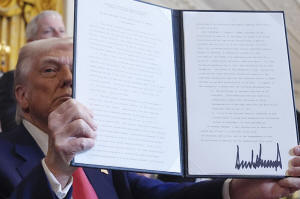Trump goes with his gut and the world goes along for the ride
[April 14, 2025]
By CHRIS MEGERIAN
WASHINGTON (AP) — After President Donald Trump reversed course on his
tariffs and announced he would pursue trade negotiations, he had a
simple explanation for how he would make decisions in the coming weeks.
“Instinctively, more than anything else,” he told reporters this past
week. “You almost can’t take a pencil to paper, it’s really more of an
instinct than anything else.”
It was the latest example of how Trump loves to keep everyone on edge
for his next move. Trump has not only expansively flexed the powers of
the presidency by declaring emergencies and shredding political norms,
he has eschewed traditional deliberative procedures for making
decisions. The result is that more of life around the country and the
world is subject to the president’s desires, moods and grievances than
ever before.
“We have a democratic leader who seems to have the authority to act as
whimsically as a 19th century European autocrat,” said Tim Naftali, a
historian and senior research scholar at Columbia University. “He
sneezes and everyone catches a cold.”
The White House rejects criticism that Trump is overstepping his
authority or improperly consolidating power. Administration officials
frequently emphasize that the Republican president won a clear election
victory and is now pursuing the agenda that he campaigned on. In this
view, resisting his will, such as when courts block his executive
orders, is the real threat to democracy.
“Trust in President Trump," White House press secretary Karoline Leavitt
said Friday while answering questions about economic policy. "He knows
what he’s doing.”

The presidency has been accumulating power for years, long before Trump
ran for office, and it is not unusual for administrations to veer in
various directions based on political and policy priorities. But Trump's
new term has been different in the early months, and he seems to
recognize it.
“The second term is just more powerful,” Trump marveled recently. “When
I say ‘do it,’ they do it.”
Although international trade offers the most extensive example of
Trump’s inclination to act unilaterally since he returned to office in
January the same approach has been evident elsewhere.
He installed himself as chair of the John F. Kennedy Center for the
Performing Arts to overhaul programming at Washington’s premier cultural
institution. He issued an order to purge “improper ideology” from the
Smithsonian Institution's network of museums. He punished law firms
associated with his opponents. He directed the Justice Department to
investigate former officials who crossed him during his first term.
When Trump decided to remove regulations on household water efficiency —
he wants more water flowing in showers — his executive order said the
normal public comment period "is unnecessary because I am ordering the
repeal."
“What the president ends up having is what he wants, which is everyone’s
attention all of the time,” Naftali said.
Trump’s ambitions stretch beyond the United States, such as his goal of
annexing Greenland. Vice President JD Vance visited the island last
month to talk about its strategic location in the Arctic, where Russia
and China want to expand their influence, but also its importance to
Trump himself.
“We can’t just ignore the president’s desires,” Vance said.
Trump has spent decades trying to turn his impulses into reality,
whether it's skyscrapers in Manhattan or casinos in Atlantic City, New
Jersey. He once sued a journalist for allegedly underestimating his net
worth. During a deposition, Trump said "it goes up and down with the
markets and with attitudes and with feelings, even my own feelings.”
[to top of second column]
|

President Donald Trump holds a signed executive order during an
event in the East Room of the White House, Tuesday, April 8, 2025,
in Washington. (AP Photo/Evan Vucci)

A lawyer for the journalist appeared puzzled. "You said your net
worth goes up and down based upon your own feelings?”
Trump said yes. “I would say it’s my general attitude at the time
that the question may be asked.”
He took a similar approach into the White House for his first term.
While talking about the economy with The Washington Post, Trump said
“my gut tells me more sometimes than anybody else’s brain can ever
tell me.”
Leon Panetta, who was White House chief of staff under Democratic
President Bill Clinton and later served in national security roles
for Democratic President Barack Obama, said there normally is a more
deliberative process for critical issues.
“If you throw all of that out of the window and operate based on gut
instincts, what you’re doing is making every decision a huge
gamble,” Panetta said. “Because you just haven’t done the homework
to really understand all of the implications.”
“When you roll dice,” he added, “sometimes it’s going to come up
snake eyes.”
Because Trump does not have a clear process for making decisions,
Panetta said “that means everybody has to kowtow to him because
that’s the only way you’re going to have any impact.”
Trump has seemed to enjoy that aspect of the ongoing controversy
over tariffs. During a Republican dinner this past week, he said
foreign leaders were “kissing my ass” to talk him out of his trade
agenda.
The saga began on April 2 when Trump declared that trade deficits —
when the U.S. buys more products from some countries than it sells —
represented a national emergency, enabling him to enact tariffs
without congressional approval.
The stock market collapsed and then the bond market began to slide.
On Wednesday, Trump backed off his plans.
Although high taxes have been left in place on imports from China,
many of the other targeted tariffs have been paused for 90 days to
allow time for negotiations with individual countries.
“Americans should trust in that process," said Leavitt, the press
secretary.

Scott Lincicome, vice president of general economics at the
conservative Cato Institute, expressed concern that the course of
international trade was becoming dependent on the “whims of a single
dude in the Oval Office."
Lincicome said the White House timeline to reach trade deals was
“not credible" given the complexity of the issues. A more likely
scenario, he said, is that the resulting agreements will be nothing
more than “superficial nothingburgers” and Trump will ”declare a
great victory and all this stuff settles down.”
Peter Navarro, Trump's trade adviser, said in an interview with Fox
Business Network that there's “a whole portion of our White House
working day and night” on negotiations.
“We’re going to run 90 deals in 90 days,” he said. "It’s possible.”
All contents © copyright 2025 Associated Press. All rights reserved |